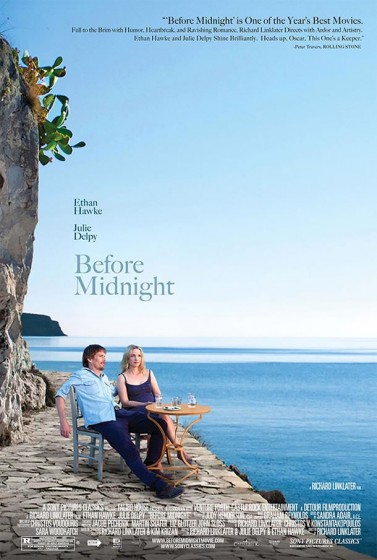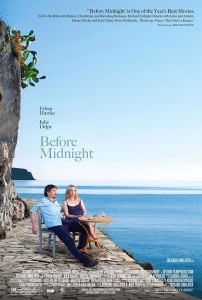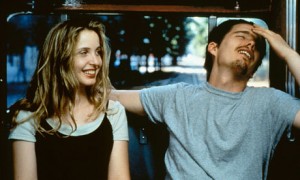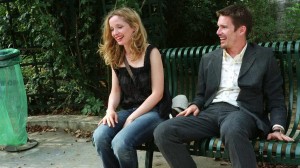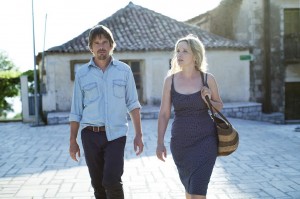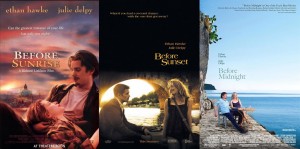Directed by Richard Linklater
Written by Linklater, Julie Delpy and Ethan Hawke, based on characters by Linklater and Kim Krizan
What might have been film history’s most unlikely—and delightful—sequel gets a sequel.
Back in 1995 Linklater told a story in Before Sunrise that had the tang of authenticity and autobiography; two 20-somethings meet on a train outside Vienna. They spend the night together, walking and talking. They’re both a little self-involved and heady, but with a sense of adventure, of humour, and love of life. We get a gorgeous travelogue of Vienna behind an optimists view of young love. It’s a great time, even though Ethan Hawke, with his greasy hair and greasy manner, could be annoying, fresh from a star-making role in Reality Bites.
Then, nine years later (in both real time and cinematic time) they meet again in Paris in Before Sunset. Of the three movies it’s still my favourite, providing a depth of experience to enrich its predecessor, along with more of its seductive romanticism. These two mismatched people, American writer Jesse (Ethan Hawke) and French activist Celine (Julie Delpy), might get a second chance at being together. And who doesn’t love an idea like that?
But one more time around nine years later? And when Before Sunset ended with one of the most perfect ambiguous fade-to-black endings of all time? It’s a gutsy move from all involved.
So: We find in Before Midnight that Jesse and Celine are together. It worked out! While they live in Paris, they’re vacationing in Greece, a first vacation since the birth of their adorable moppet twin daughters. Jesse has a son, Hank, from his previous relationship. At the film’s start he says goodbye to Hank at the airport. Hank’s headed back to live with his mother in Chicago after a great summer vacay with dad.
Cue the mostly two-hander, split over four sections: a car ride back to the villa, a meal with other couples, a walk through the countryside, and the denoument in a hotel room, where lingering resentments overflow.
It’s great to see these two again, just spending time in their company. When the conversation flows, easily jumping from one subject to another, it recaptures all the naturalistic joy of those first two movies.
Though I will say, there were moments this time around the conversational conceit did seem a bit more forced, especially in the third section, the long walk through the countryside. Segments that begin with “I remember this time…” don’t work as well with a couple that’s been together for nine years. It’s hard to believe when Jesse tells Celine all about his grandmother she hasn’t already heard the story.
And, of course, now that these two have been together for awhile, there’s going to be friction. The idealism has evaporated, replaced by all the boredom, frustrations and mundane everyday challenges of life. This is to be expected.
But I must admit, I was a little disappointed. And I think this speaks to my own romantic idealism, as well as what I liked about the previous two films. The characters who had so much hope and attraction to each other. Of course, it makes sense that in order to keep exploring these mating dynamics they’d dig into the subterranean dissatisfaction in their relationship. It wouldn’t be much of a movie if there was no conflict.
But they aren’t nearly as good at being in a relationship as I’d hoped. That Jesse would utilize passive-aggressive tropes with Celine to avoid addressing his real insecurities around being a good father to Hank is bad enough. Worse that he hasn’t overcome his vanity. But in a general way, Ethan Hawke has mellowed and is more comfortable in his skin, more likeable.
Celine, however, is a real piece of work. She’s gone from feeling a bit lost and disillusioned in her professional and romantic life in Before Sunset to being a full-on dramatist. She blames Jesse for all their problems and catastrophizes at the drop of a hat. She’s full-on miserable, and maybe that’s because it’s as she says; She has to manage much more of the responsibilities of the relationship and the kids than he does. Maybe he’s still too selfish, too adolescent, to meet her halfway. But it seems to me she’s choosing to pick at the problems, blowing them up out of proportion, rather than offer realistic solutions based on the life they’ve made together.
These two clearly have so much good in their lives, it’s really hard to watch them fight. Maybe that’s the lesson here, that after the wonderful story of chance meeting, and then the much-later follow-up, love is often not enough to make people happy. You have to choose to be happy, to fight to be, almost despite the challenges of the person you’re with. Sadly, now in their 40s, Celine and Jesse are sweating the small stuff.
I happen to be roughly the same age as the protagonists, so I can’t help but compare my experience of life and love with theirs. And I have a friend (also roughly my age, our age) to whom I recently showed the first two movies in this series. She found Jesse and Celine painfully self-absorbed from the beginning. Does that mean I’m self-absorbed, too? Could be. I love that this series makes me ask these questions, pokes at me and my feelings on these issues.
And I applaud Hawke, Delpy and Linklater for continuing this experiment, especially as now the performers are co-credited with the screenplay. It’s like a fictionalized, romantic take on Michael Apted’s 7-Up. And even while this time I wasn’t as enthused about my visit with Jesse and Celine, I’ve done the math. In 2022, nine years from now, they will be just about 50. I look forward to seeing where they are (and I am) then.
I just hope they’ll be happier than they are now.





